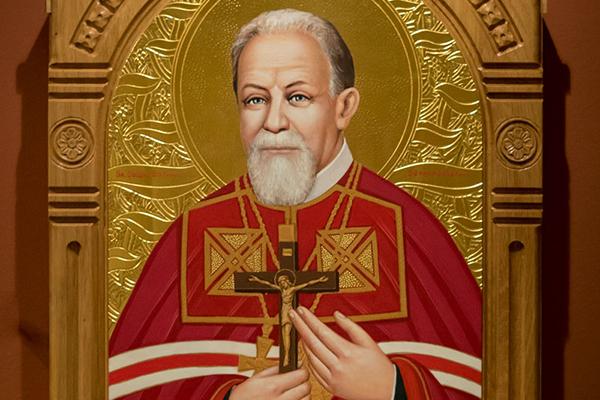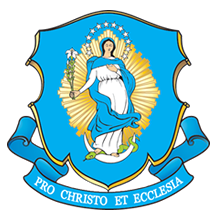
Father Vasyl decided to give his fellow inmates a 10-day mission about the faith. He made Rosary beads from bits of bread, which hardened to become makeshift beads. It is no wonder that Blessed Vasyl is now the patron of prison ministry.
Welcome to "North American Sanctity," a series on holy men and women, boys and girls, saints and those on the road to sainthood, from Canada, the United States, and Mexico. Some will be familiar, others less so; but all are inspiring!
By Kimberly Bruce
He may not have been born in Canada, but he was exiled and died there, and a national shrine of Canadian martyrs is named for him. He is Blessed Bishop Vasyl Velychkovsky (feast day: June 27), a Ukrainian Greek Catholic bishop martyred for the faith after the Soviet Union’s takeover of Ukraine during World War II.
Considered the “Father of the Underground Church” in Ukraine, Bishop Velychkovsky was imprisoned and severely tortured by the Soviets. Exiled to Canada, within a year he died of his injuries. He was beatified a martyr by Pope St. John Paul II in 2001, and his body, exhumed in 2003, was found to be incorrupt.
The Bishop Velychkovsky National Martyr’s Shrine, dedicated to this great man of faith, was Canada’s second shrine built to honor martyrs. (Canada’s National Shrine to the Canadian Martyrs was the first.) Built in 2002 in Winnipeg, Manitoba, the Velychkovsky Shrine contains the remains of his body. It is a place where pilgrims come to pray, ask for Bl. Vasyl’s intercession, and visit the shrine’s museum.
Soldier for Christ
Vasyl was born on June 1, 1903, to devout parents, Volodymyr and Anna. Volodymyr was a married Ukrainian Greek Catholic priest, as clerical marriage is a common tradition in the Eastern Catholic Church.
At age 15 Vasyl joined the Ukrainian Galician Army during World War I to fight for his country’s independence. During his service, he discerned the best way to fight for his homeland was to become a “soldier for Christ.” He entered a seminary in Lviv in 1920 and soon joined the Congregation of the Most Holy Redeemer (the Redemptorists).
During his third year in seminary, he made the decision to be a celibate diocesan priest and was ordained in 1925. Choosing not to marry was unusual in his Church’s tradition, as most diocesan priests married before their ordination. Once ordained, like our deacons today, they can never marry.
Soviet persecution
Father Vasyl was a missionary who then became Superior at a monastery in Stanislav. Once the Soviets began their occupation and persecution of Catholics in Ukraine in 1939, Fr. Vasyl moved to central Ukraine and then to Galicia, where he became Superior of the Dormition Monastery.
Then in 1945, the Soviets outlawed the Ukrainian Greek Catholic Church and arrested Fr. Vasyl and others for “anti-Soviet activities.” In prison for almost a year, he was sentenced to death by firing squad.
While on death row, Fr. Vasyl ministered to the other death-row inmates. Initially overly occupied with his own imminent demise, Father wanted to spend his time preparing his soul for death. The prisoners, however, knowing he was a priest, wanted him to teach them about God.
Father Vasyl decided to give his fellow inmates a 10-day mission about the faith. He began by teaching them the Our Father and Hail Mary prayers and continued with teachings on the Eucharist and Confession. He made Rosary beads from bits of bread, which hardened to become makeshift beads. It is no wonder that Bl. Vasyl is now the patron of prison ministry.
After three months on death row, Father’s sentence was commuted to ten years of hard labor in the Soviet Union’s coal mines in the north. There, he became “chaplain” to those he worked alongside with in the mines. He was released ten years later in 1955.
Episcopal ordination
During the next few years, he quietly performed Catholic baptisms, marriages, and other religious services. Then in 1959, he was secretly ordained a Ukrainian bishop by Metropolitan (Bishop) Josyf Slipyi in a Moscow hotel room. The Metropolitan, who himself had just been released from prison, was enroute to the Second Vatican Council.
Bishop Vasyl found himself again imprisoned in 1969 for writing a book on Our Lady of Perpetual Help. During his three-year sentence, Bishop Vasyl was horribly tortured with electricity and drugs that deliberately damaged his heart and nervous system. Released in 1972, he was banished from Ukraine and so immigrated to Canada. In poor health of mind and body, Bishop Vasyl died a martyr on June 30, 1973 in Winnipeg at the age of 70.
Bishop Vasyl never wavered during all the Soviets’ offers of release if he would just “sign the paper” stating he would become a Russian Orthodox priest. His story is all the more poignant when we consider the present struggle of Christians in Ukraine, as Russia’s war continues for a third year.
Considering Bishop Vasyl’s sufferings, we can look at Our Lord’s words to St. Faustina:
I will now instruct you on what your holocaust shall consist of, in everyday life, so as to preserve you from illusions. You shall accept all sufferings with love. Do not be afflicted if your heart often experiences repugnance and dislike for sacrifice. All its power rests in the will, and so these contrary feelings, far from lowering the value of the sacrifice in My eyes, will enhance it. Know that your body and soul will often be in the midst of fire. Although you will not feel My presence on some occasions, I will always be with you. Do not fear; My grace will be with you… (Diary of Saint Marian Faustina Kowalska, 1767).
So, what does this mean for us? How do we answer the call to love and sacrifice in our own lives? Our Lord, again, answers through his words to St. Faustina:
My daughter, in this meditation, consider the love of neighbor. Is your love for your neighbor guided by My love? Do you pray for your enemies? Do you wish well to those who have, in one way or another, caused you sorrow or offended you? (Diary, 1768).
May we take these words to heart and ask Bl. Vasyl to assist us by his prayers to love our enemies and to be steadfast witnesses of Christ and His Church, with a special intention for peace in Ukraine and an end to the war.
Blessed Bishop Vasyl Velychkovsky, pray for us!
For more information on Bl. Bishop Velychkovsky, watch Dr. Bryan Thatcher’s interview with Fr. John Sianchuk, Director of the Bishop Velychkovsky National Martyr’s Shrine.
Next in the series: Saint Junípero Serra, July 1.
Previous article
{shopmercy-ad}
















